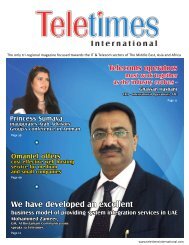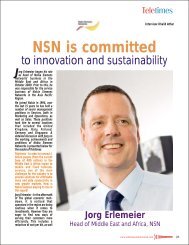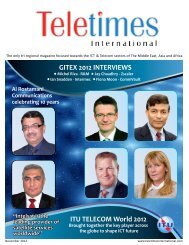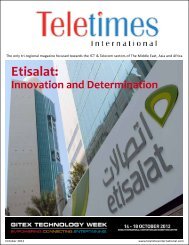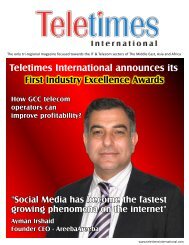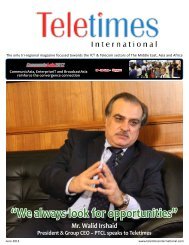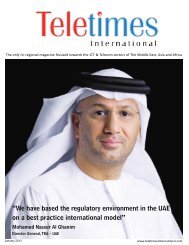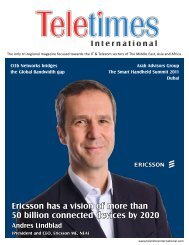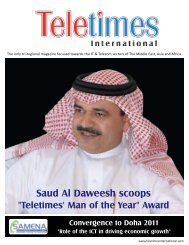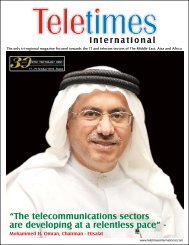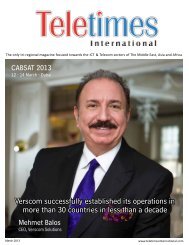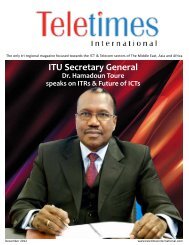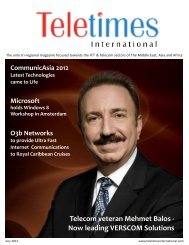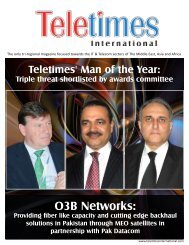34-36 Interview Dr. Amer Awadh Al Rawas.pdf - Teletimes
34-36 Interview Dr. Amer Awadh Al Rawas.pdf - Teletimes
34-36 Interview Dr. Amer Awadh Al Rawas.pdf - Teletimes
- No tags were found...
Create successful ePaper yourself
Turn your PDF publications into a flip-book with our unique Google optimized e-Paper software.
of them was mostly related market has different segwithtreasure hunt, money ments, mostly Oman has theand old castles, the other one price sensitive segment.was about the habits of Oman is characterized by veryhaving coffee and the third young population, so they areone was about harvesting price sensitive. <strong>Al</strong>so Omancrops, particularly date crops. has a quite significantSo those are games that we number of low income people;have been using the best and they are also price sensitive,latest technologies but so for the majority it is a pricebasically reflecting our sensitive market. Nevertheculture.less there are service qualityQ - Where does Omantelsensitive kinds of segments;stand in meeting expectawetry to provide for those.tions about new technologiesThe low income peoplein Oman, as of competition doexpect a lower price, continu-you believe that a healthyous balancing of prices,competition is established Incontinuous promotions,Oman?value added services, the highspeed mobile Internet and soAns - As you know any on. As far as the competition,<strong>Dr</strong>. <strong>Amer</strong> <strong>Awadh</strong> <strong>Al</strong> <strong>Rawas</strong> holds a Ph.D inComputer Science and Artificial Intelligencefrom the Sussex University UK. In the academicfield, prior to his joining the Telecom Sector, <strong>Dr</strong>.<strong>Rawas</strong> served in various academic and leadershippositions at the Sultan Qaboos University.His last assignment was the Dean of EducationalServices.<strong>Dr</strong>. <strong>Rawas</strong> is still affiliated with various educationaland technological policy forums in theSultanate and other states. including Member ofthe Higher Education Council, the NationalAccreditation Council, the Board of Governorsfor the Higher Technology Colleges, and Memberof the Board and Treasurer of the Sultan QaboosCultural Center in Washington DC, United States.<strong>Dr</strong>. <strong>Rawas</strong> won the re-diffusion Simulation LtdPrize for the best Software Engineering GraduationProject in the UK in 1990 and won the NTIBizPro Business Leader of the Year Award in2008. He was invited as a Visiting Scholar at theSoftware Research Lab at NASA (USA) in 1995-1997 and as an honorary guest to the 3rdmeeting of the Nobel Laureate of EconomicSciences in Germany, August 2008. He is also amember of the International Institute of StrategicStudies.<strong>Dr</strong>. <strong>Rawas</strong> is the Chief Executive Officer of OmanTelecommunications Company (Omantel) now.Omantel CEO, <strong>Dr</strong>. <strong>Amer</strong> <strong>Awadh</strong> <strong>Al</strong> <strong>Rawas</strong>believes that the risks of convergence are thepossibility to spend too much on technology andtoo little on service provisioning thus in the endnot to get the results back. Stating that as acompany they think that they can still make thesame money, provide the same services whilepreserving their identity and they have beentrying to introduce cultural values.Emphasizing that seamless service to theindividuals cannot be offered without reallycaring what kind of technologies they use in suchan environment that mobile, fixed and Internetare converged, <strong>Al</strong> <strong>Rawas</strong> says: “l believe theregion needs to reassess the value of convergencewhich is a very good statement actually;we need to reassess what value we are gettingfrom the convergence and then weight or givethe same kind of investment.”www.teletimesinternational.com 35



